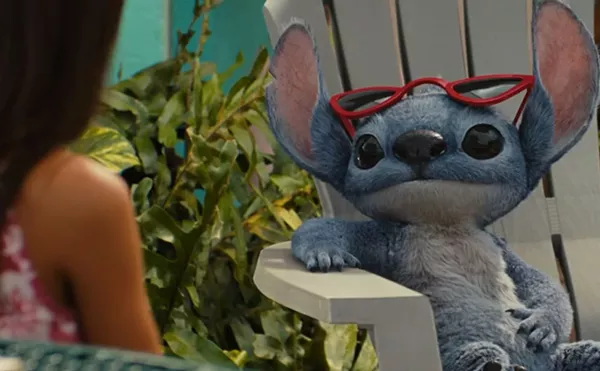
Audio By Carbonatix
[
{
"name": "GPT - Leaderboard - Inline - Content",
"component": "35519556",
"insertPoint": "5th",
"startingPoint": "3",
"requiredCountToDisplay": "3",
"maxInsertions": 100,
"adList": [
{
"adPreset": "LeaderboardInline"
}
]
}
]
I discovered Lee the year after I graduated from college, reading his first book, Rose, in my cubicle at a soul-sucking data-entry job. By the pale bluish light of a computer monitor, surrounded on three sides by 4-foot beige walls, I came across this passage in "Always a Rose" — a lyric poem covering an expansive territory of exile, grief, love, death, his loved ones and the near-mythic figure of his deceased father:
and where there is rain
there is time, and memory, and sometimes sweetness.
where there is a son there is a father.
and if there is love there is
no forgetting, but regret rending
two shaggy hearts.
These lines struck me with such force that I lay my head down on my invoice-covered desk, hiding my tears at the tremendous beauty and sorrow of that unleashed music, full of pain, worship and longing. But more than raw emotion, there was the sense of awe and transcendence. I didn’t feel the need to analyze it then (I merely relished it) and struggle to express now — poetry at its most powerful.
Lee’s early life is in itself remarkable. He was born in 1957 in Djakarta, Indonesia, to Chinese parents. Lee’s father had been a physician to Mao Tse-tung and spent a year as a political prisoner in President Sukarno’s jails. He escaped in 1959 and fled Indonesia with his family, traveling for five years in Hong Kong, Macao and Japan, before finally coming to the United States. The family settled in rural Pennsylvania, where his father served as Presbyterian minister to an all-white congregation and took Lee along for visits to the homes of poor families, the elderly and shut-ins.
Reading Lee’s work you enter into another realm, the seat of the sublime or spiritual. And yet he doesn’t elect to shut out what some might consider mundane subjects. He locates a living urgency even in seemingly small events, like braiding his wife’s hair or reading his son a story. Lee isn’t interested in wordplay or cleverness for its own sake. He writes about the stuff of life — family, love, sexuality, loneliness, God, death, the natural world, the cosmos — and he does it with grace and tenderness, honoring the beauty of poetic speech, but reaching for meaning that surpasses language.
His poems are inspiring and real, often accessible and yet just as often challenging, even metaphysical. But his more difficult work still exudes an inherent honesty and humility, refreshingly devoid of intellectual hubris. Even when I don’t know where he’s going, I trust him and follow. And, as I learned in my recent interview with him, Lee doesn’t view art as a solely mental pursuit. For him, poetry is "natural religion."
On the phone, Lee is soft-spoken and polite. He says, "Please, call me Li-Young" and asks whether he may use my first name. He’s modest and self-effacing about his own skills as a poet, admitting to feeling like a "pretender" next to poets such as Whitman or Dickinson or Neruda. Instead, he enthusiastically praises the work of various contemporaries. He praises Gerald Stern, for instance, to whose soul he colorfully likens "a city, full of libraries, philosophers arguing, mathematicians trying to figure out the orbits of the stars."
Lee’s fascination with poetry took root when he was a small child learning English. "I started rhyming words without understanding what the words meant. So immediately I just loved the language. My parents were both classically educated in China and they memorized hundreds of Chinese poems. They recited poems all the time at home and so I heard a lot of Chinese poetry and I was always moved by how moved my parents were by it. I always thought it was something really special and wonderful."
He goes on to explain how sacredness can be found in everyday activities. Even when "we’re sweeping the floor or making tea or folding laundry, if we do it with a kind of absolute presence and gratitude and attention to our own mortality and our own eternity while we’re doing that activity, then folding laundry becomes [religious]." In Lee’s poems, then, even the smallest things take on a holiness and ignite the imagination, as in this opening passage from "The Gift":
To pull the metal splinter from my palm
my father recited a story in a low voice.
I watched his lovely face and not the blade.
Before the story ended, he’d removed
the iron sliver I thought I’d die from.
He goes on to illuminate how this "gift" gets passed on:
Had you entered that afternoon
you would have thought you saw a man
planting something in a boy’s palm.
a silver tear, a tiny flame.
Had you followed that boy
you would have arrived here,
where I bend over my wife’s right hand.
Look how I shave her thumbnail down
so carefully she feels no pain.
Watch as I lift the splinter out.
The poem ends with the simple, yet far-reaching observation: I did what a child does/when he’s given something to keep./I kissed my father.
Finally, I get around to asking him about the theme of love in his poetry, because it is the tenderness — whether for his wife or family or the natural world — that always gets me.
"I feel as if poetry can be an act of love in the best sense. Of love for the reader, love for the world. It’s a way to give the best of you. And poetry can be a way to pray, even amidst the stuff that we see in the world sometimes that makes you want to lose hope. It saves my life all the time. So I really believe that poetry, again, is … religious in this way. Links us or connects us, reminds us of that necessity to love and pray."
This poet is the real thing and anyone with even a glimmer of interest in poetry should go to see him read Sunday at 4:30 p.m. at Lit Fest. Yes, he has won awards and been published widely (he’s the author of three books of poetry — Rose, The City in Which I Love You and Book of My Nights — all from BOA Editions, as well as a memoir, The Winged Seed: A Remembrance, from Simon and Schuster). He is asked to speak across the country, yet has turned down lofty teaching positions and elects to work in a warehouse. But don’t go to be impressed by a Great Poet. Go to hear that still small voice resonating through the vulnerably human — and triumphantly humane — words of Li-Young Lee. Christina Kallery writes about verbal and visual style for the Metro Times. E-mail her at letters@metrotimes.com





